Category Archives: Nuns on the Bus 2016
Slideshow: Congressman Larson Brunch
Slideshow: Providence Caucus
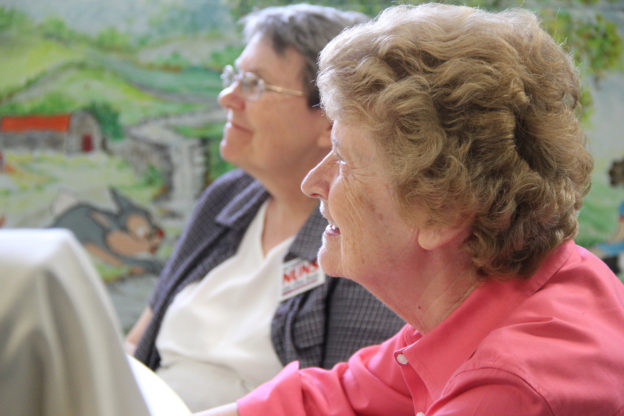
Travel Log: Providence

Travel Log: Providence
Sisters Eileen Reilly, SSND and Richelle Friedman, PBVM
July 23, 2016
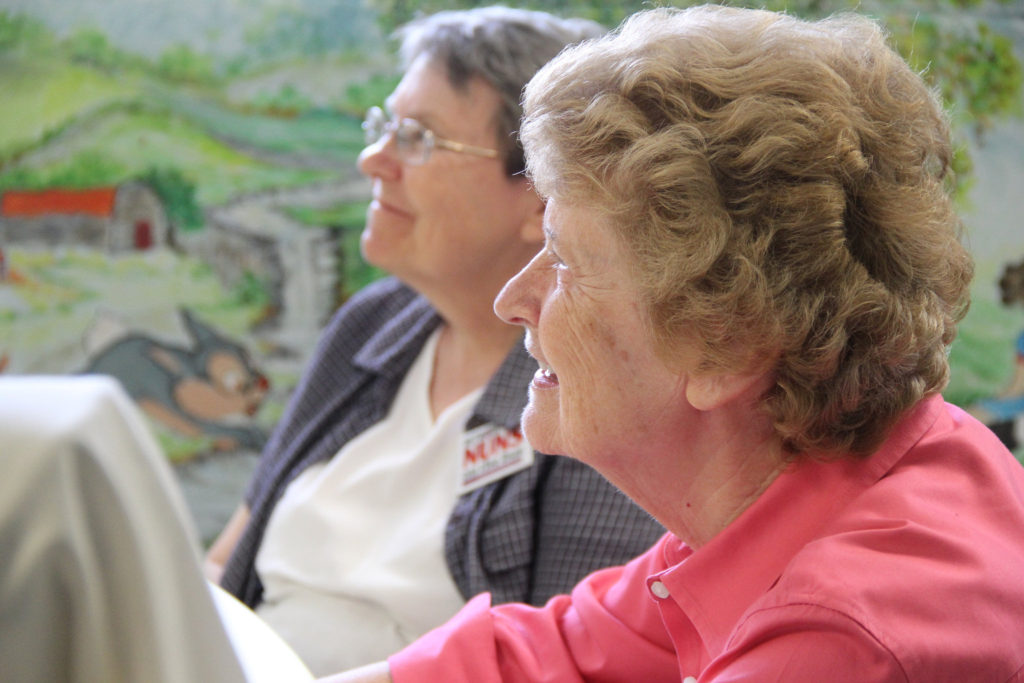 On Saturday afternoon, we headed to Providence where we had three events planned for this afternoon and evening.
On Saturday afternoon, we headed to Providence where we had three events planned for this afternoon and evening.
Our first stop was McAuley Village founded by the Sisters of Mercy. We were privileged to hear the stories of the women in transitional housing who expressed deep gratitude to the staff there for their support, love, patience and help in navigating the educational, housing and service systems.
One person singled out for her kindness was Sr. Joan with phrases like, “If I didn’t have someone like Sr. Joan I don’t know where I’d be…. This woman is so beautiful…. She is so awesome.” One middle school young boy came over and gave Sr. Joan a warm hug before he left the room. The program includes two other sites – McAuley House where meals are served and hospitality offered and the Ward-robe which is a volunteer-supported thrift store offering quality used clothing and household goods.
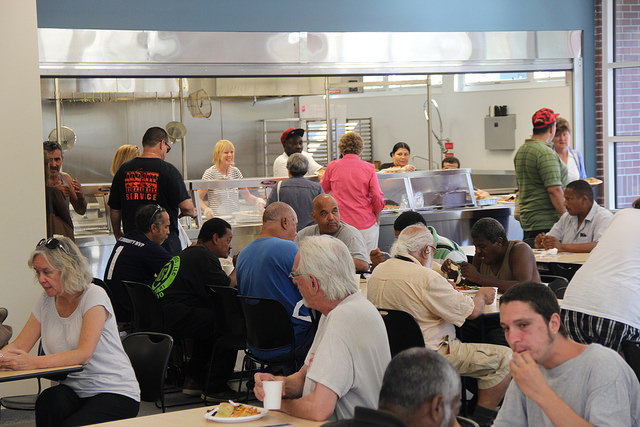 We had supper at Amos House which is celebrating “Forty Years of Helping People Help Themselves.” Their campus of fourteen buildings includes a restaurant, supportive housing, a mother-child reunification center, a ninety day recovery program, as well as job and literacy training. The sparking new dining area with its entire wall of windows made for a bright and inviting space. We were struck by how grateful those we sat with were for the meal they’d received. Some were residents of one of Amos House’s transitional or supportive housing units and some came in from the streets. Tyler spoke with pride about marking his third month of being clean. Another man asked me to pray with him since his wife had just died. As we ended the prayer, one of the other men said, “I think some of that rubbed off on me.”
We had supper at Amos House which is celebrating “Forty Years of Helping People Help Themselves.” Their campus of fourteen buildings includes a restaurant, supportive housing, a mother-child reunification center, a ninety day recovery program, as well as job and literacy training. The sparking new dining area with its entire wall of windows made for a bright and inviting space. We were struck by how grateful those we sat with were for the meal they’d received. Some were residents of one of Amos House’s transitional or supportive housing units and some came in from the streets. Tyler spoke with pride about marking his third month of being clean. Another man asked me to pray with him since his wife had just died. As we ended the prayer, one of the other men said, “I think some of that rubbed off on me.”
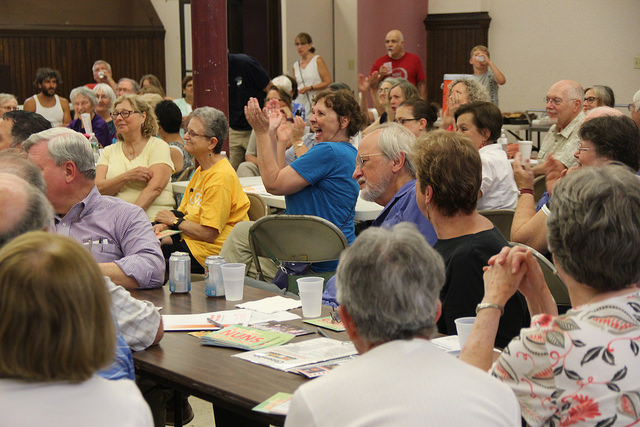 A big event of our days is a two-hour caucus wherein participants grapple with the NOTB mend the gap issues. When we arrived at St. Michael’s parish in Providence we were greeted by the tune of When the Saints go Marching In by the Extraordinary Rendition Band. It seems this band shows up at rallies, demonstrations, and events like ours to add some spirit. They successfully managed to bring new energy to us who were showing signs of weariness after a long day.
A big event of our days is a two-hour caucus wherein participants grapple with the NOTB mend the gap issues. When we arrived at St. Michael’s parish in Providence we were greeted by the tune of When the Saints go Marching In by the Extraordinary Rendition Band. It seems this band shows up at rallies, demonstrations, and events like ours to add some spirit. They successfully managed to bring new energy to us who were showing signs of weariness after a long day.
The caucus of over 100 first talked about areas problematic to Providence and Rhode Island. Among the issues they raised were a recent defending of mental services, poverty in the schools as indicated by a 97% rate of kids eligible for free and reduced lunches, a legislature where too much power is concentrated in the hands of the Speaker of the House, and the list went on. The best part of the caucuses is when small groups are asked to talk about what it would look like if those problems with were addressed. After their visions for a better future are shared, a sense of hope fills the room.
At each of the events those gathered pledge to do their part to create a better reality and are invited to sign the bus. The bus is ready to move on with the nuns and the thousands we take with us that we’ve met and who have signed the bus.
See also:
Slideshow: McAuley Ministries (Providence) Site Visit
Slideshow: Amos House
Slideshow: Providence Caucus
Slideshow: Amos House (Providence)
Slideshow: McAuley Ministries (Providence)
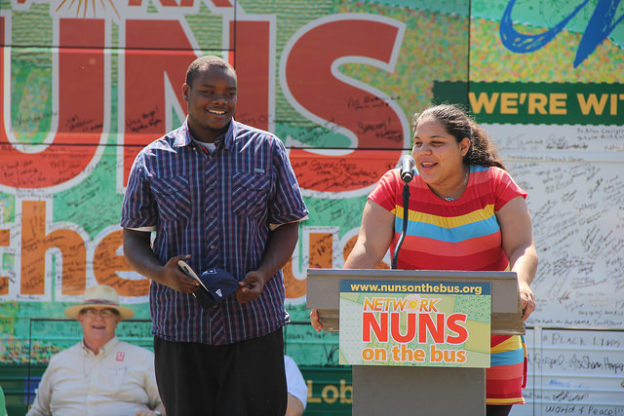
Travel Log: Boston Rally

Travel Log: Boston Rally
Sisters Eileen Reilly, SSND and Richelle Friedman, PBVM
July 23, 2016
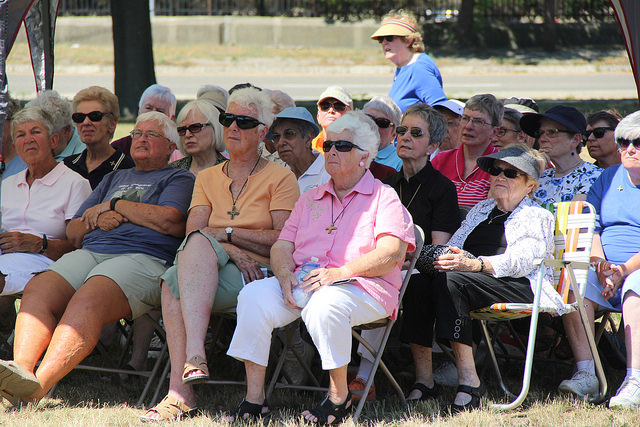 Eileen, enthusiastically announced we just entered her home state of Massachusetts as we crossed the state line this morning. We soon found ourselves warmly welcomed to the rally on the lawn of Boston College High School. “Warmly” is putting it mildly: as the temperature rose into the 90’s the huge crowd that had gathered moved their chairs under the awnings we provided or under the nearby trees. Although dispersed across the lawn, the crowd of a couple of hundred people was engaged and enthusiastic as we presented our “Close the Gap” program.
Eileen, enthusiastically announced we just entered her home state of Massachusetts as we crossed the state line this morning. We soon found ourselves warmly welcomed to the rally on the lawn of Boston College High School. “Warmly” is putting it mildly: as the temperature rose into the 90’s the huge crowd that had gathered moved their chairs under the awnings we provided or under the nearby trees. Although dispersed across the lawn, the crowd of a couple of hundred people was engaged and enthusiastic as we presented our “Close the Gap” program.
As always we begin with some local people sharing the stories of the gaps they experience and the steps they are taking to close them.
Sharon has volunteered for 35 years at Haley House where services include job training and housing done with mutual respect for those they serve. Job training included creating the Bakery House Café, host of the delicious lunch we enjoyed.
Reverend Ellen Fifth, herself disabled, is an untiring advocate for access for those with disabilities.
Peter Buck put a face on Equal Exchange that works to bring products from worker cooperatives in Central America to the global market guaranteeing a profit to farmers thus mending the wage gap for these coop farmers.
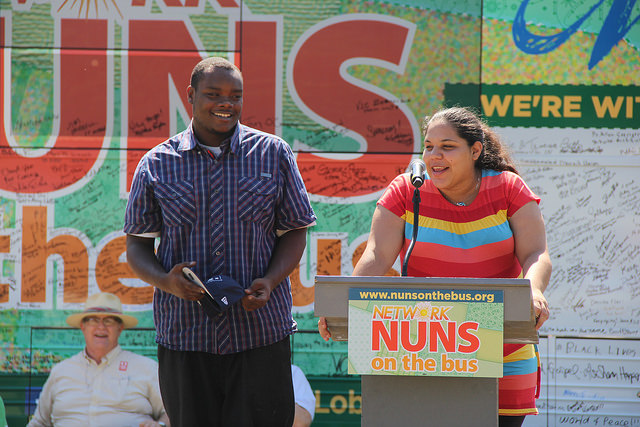 The “Fight for $15” campaign shared the story of working for a living wage – and hopefully in the future a $15 an hour wage. We loved the ‘can do’ attitude of Darius and Rita engaged in the ‘Fight for $15.’ Said Darius, “We deserve better than working 3-4 jobs and not seeing our kids.”
The “Fight for $15” campaign shared the story of working for a living wage – and hopefully in the future a $15 an hour wage. We loved the ‘can do’ attitude of Darius and Rita engaged in the ‘Fight for $15.’ Said Darius, “We deserve better than working 3-4 jobs and not seeing our kids.”
We Nuns on the Bus take turns speaking at the various events, and since we were in Eileen’s hometown, she was happy to be one of the speakers, sharing why we ride the bus and what we are learning. In Eileen’s words “It was great to share the event with family, high school classmates, friends and many nuns I knew from my days in Boston.”
We Nuns on the Bus often comment that we receive more than we give. The speakers in Boston gave us hope as they work to be inclusive, creative and loving in their approaches to the work they do.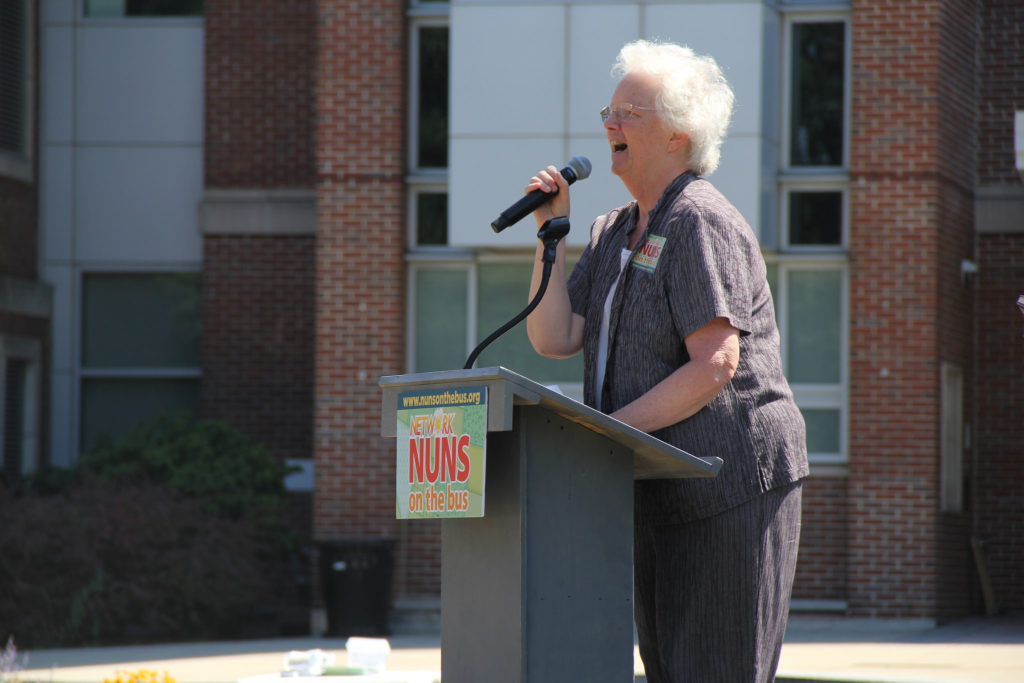 See Also:
See Also:
Slideshow: Boston Rally
Slideshow: Rally (Boston)
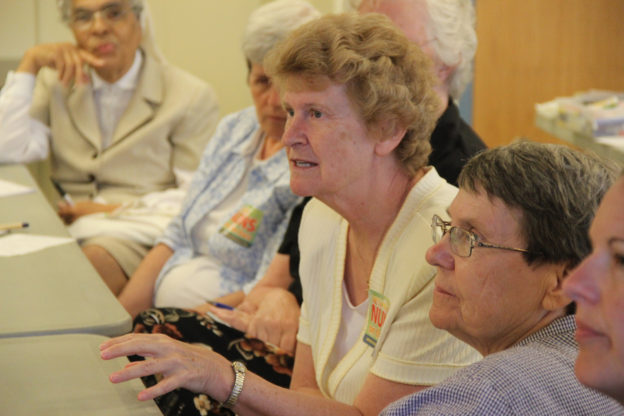
Reflection on New Hampshire: A Pivotal Moment in Time

Reflection: A Pivotal Moment in Time
Sister Jan Cebula, OSF
July 23, 2016
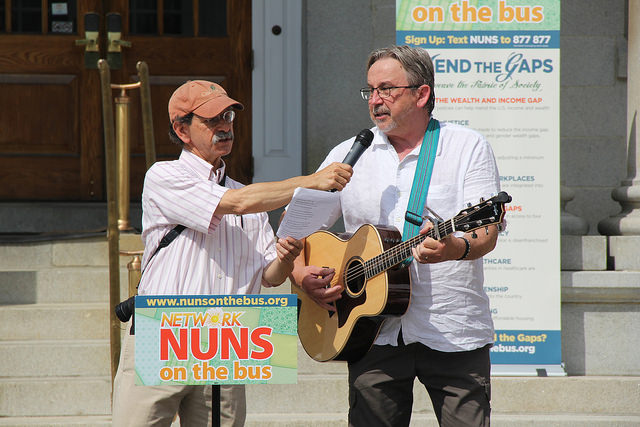 During the opening of our rally at the capitol in Concord, New Hampshire on Day #11, United Church of Christ Rev. Gary Schulte prayed for all of us in this “pivotal moment in time.”
During the opening of our rally at the capitol in Concord, New Hampshire on Day #11, United Church of Christ Rev. Gary Schulte prayed for all of us in this “pivotal moment in time.”
Yes, we as a people face some critical choices as we decide what kind of a people–a country–we want to be.
The urgency and importance of our choices become more apparent as Nuns on the Bus travels along.
I considered myself somewhat aware of how those who are impoverished are struggling. But the eye- opener to the seriousness of what’s happening on the economic front came when Amy, a woman with a master’s degree in social work, told her story. Working long hours which afforded little time to spend with her children, she chose to take a lower paying job. But the high cost of child care essentially meant she “couldn’t afford to work.” Struggling to manage on only her husband’s salary, they are now finding they unable to pay their rent.
And at this pivotal moment, the insidiousness of racism is being exposed all over the country.
Jazmin Langley, a Gates Foundation Millennial Scholar and Democracy Fellow at Open Democracy New Hampshire, passionately spoke of her experience as a biracial woman and how the economic and racial gaps are woven into the fabric of our society. It was a message we all needed to hear.
Like so many others, Amy and Jazmine have a deep desire to use their gifts to contribute to the community; to building up society. The gaps are a loss to us all!
It’s OUR choice and we all have decisions to make at this pivotal time:
Are we going to choose
–to remain isolated or recognize the strength of community?
–to be fearful or reach out with compassion and love?
–to be divisive or acknowledge we’re all in this together?
–to think we are better than others or recognize the gifts of all?
–to focus on ME first or to put us first?
–to maintain the divides or build bridges across them?
Later that day, we would meet people who are deciding who they want to be.
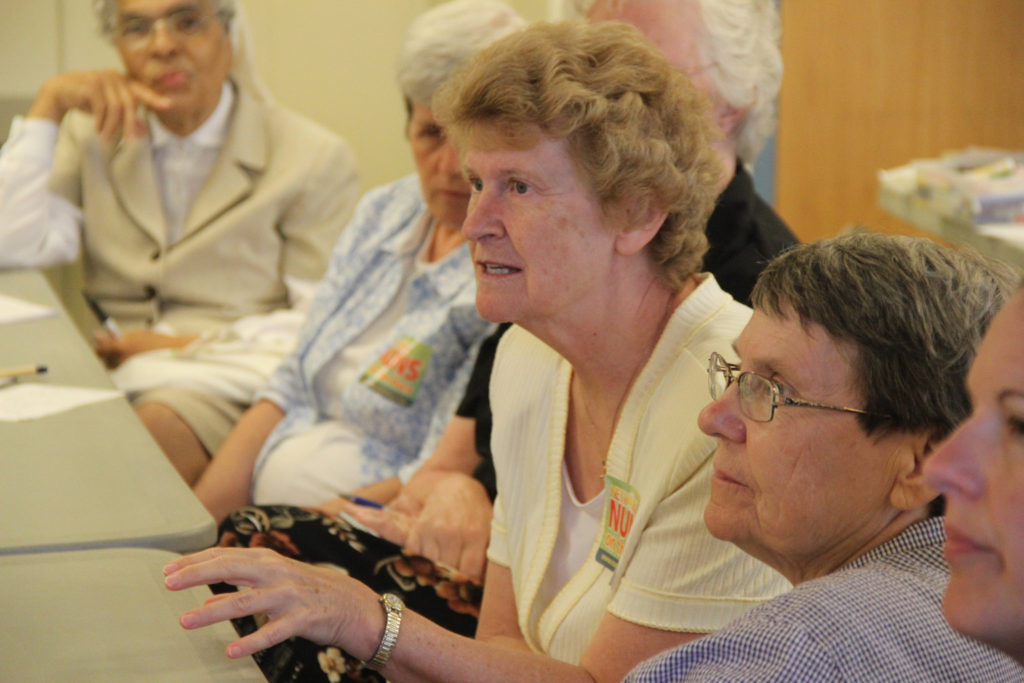 The residents at Elmwood Gardens, a 250 unit public housing development in Manchester, NH, are making their choices. Their neighborhood is one of the most diverse locales in New Hampshire and they are embracing that. They proudly told us of their efforts to establish a residents’ council with the assistance of Granite State Organizing Project. Their dedication to helping one another, especially the children, was inspiring. They are choosing community and calling forth one another’s gifts.
The residents at Elmwood Gardens, a 250 unit public housing development in Manchester, NH, are making their choices. Their neighborhood is one of the most diverse locales in New Hampshire and they are embracing that. They proudly told us of their efforts to establish a residents’ council with the assistance of Granite State Organizing Project. Their dedication to helping one another, especially the children, was inspiring. They are choosing community and calling forth one another’s gifts.
In the evening, we participated in a caucus hosted at Holy Cross Center Manor. The participants were engaged in identifying the gaps in their area and envisioning a different future with tax justice, family friendly workplace policies, living wages, decent affordable housing for everyone, access to health care for all, a pathway to citizenship and full participation in our democracy. What a healthy, wholesome and happy community it would be! Once again, it was a crowd of active people, passionate about changing the conversation, working for just policies and mending the gaps.
At the morning rally, Sister Eileen Brady reminded us of our own calling. Whenever people say to her, “You are our voice,” she responds, “No, YOU have a voice!” And Jazmin was emphatic that it is OUR democracy. It’s up to all of us.
As we depart each place, we ask people to make their own choices–to do their part in mending the gaps. We invite them to sign the bus and “ride” with us.
And so in this pivotal moment in time, we invite YOU to join us in mending the gaps and reweaving the fabric of our society. Hop on the Bus with us!
We’re all riding with the Nuns on the Bus,
We’ve got issues we need to discuss,
Get on board and ride with us,
Now’s the time to mend the gaps.
(Lyrics by Artie Alpert, Concord, NH. Sung to the tune Oh Mary, Don’t You Weep.)
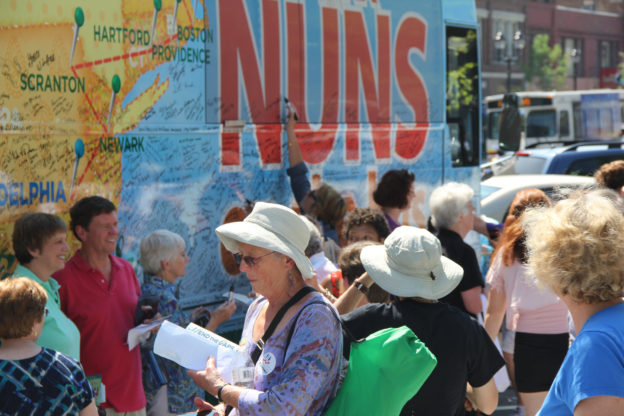
Travel Log: Concord and Manchester

Travel Log: Concord & Manchester
Sister Janet Kinney, CSJ
July 22, 2016
Although this year’s Nuns on the Bus journey began last week in Wisconsin, I only became an official “NOTB” yesterday. Travelling via Amtrak from my ministry as Executive Director at Providence House, a transitional and permanent housing organization in Brooklyn (founded by sisters of my congregation, the Sisters of St. Joseph of Brentwood), I joined the sisters in Albany, New York and began my acquaintance with wonderful women – some of whom I had already met at other experiences as a “Nun on the Ferry” and through NETWORK affiliated events.
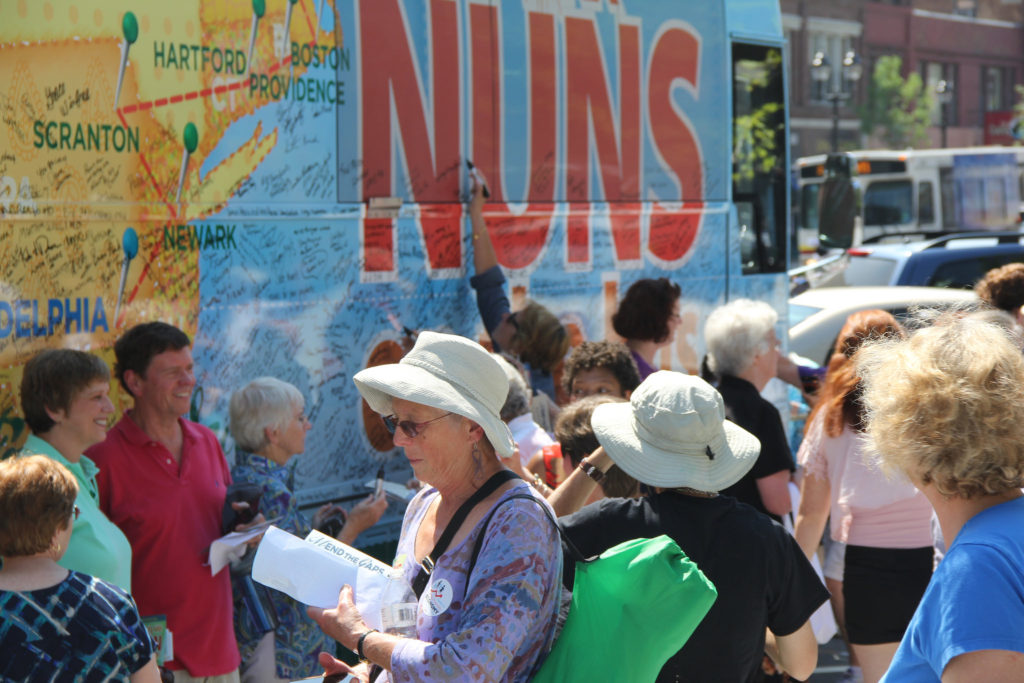 This morning as we prayed together and shared the scripture of the day, I was struck by this particular feast of Mary Magdalene, the woman who proclaimed to the disciples after the Resurrection “I have seen the Lord.” Thinking of the people I have met these two days, I too, “have seen the Lord” in the face of Christ in each of them. I have been blessed by their trust in sharing their stories, their dreams, and yes, their passion for justice and equality for all their brothers and sisters.
This morning as we prayed together and shared the scripture of the day, I was struck by this particular feast of Mary Magdalene, the woman who proclaimed to the disciples after the Resurrection “I have seen the Lord.” Thinking of the people I have met these two days, I too, “have seen the Lord” in the face of Christ in each of them. I have been blessed by their trust in sharing their stories, their dreams, and yes, their passion for justice and equality for all their brothers and sisters.
Our day began by travelling to the State Capital in Concord. Shortly before the event I was met with a big surprise – my very own cousin, Gail Kinney was the local coordinator of the rally! Gail is a New Hampshire resident, a minister affiliated with the Meriden Congregational Church, long time organizer for the United Auto Workers, and a member of both the United Church of Christ Economic Justice Ministries and Interfaith Voices of Faith groups. Who better than Gail to welcome us!
Like rallies held before this one, 4 local residents spoke on the gaps that have most intimately affected their personal lives. The rallies are a great illustration of the power of storytelling. Two mothers told stories of the challenges of raising young children and trying to support their families. The need for a living wage and the gap that currently exists is very real. Both women were well educated yet employment that paid a living wage eluded them. When Jazmin, a biracial college student got up and spoke and told us she carries her student ID in front of her driver’s license just in case she gets stopped by law enforcement, we knew that the racism gap is real. It was one of many humbling moments for me, a woman with white skin who has never had this worry.
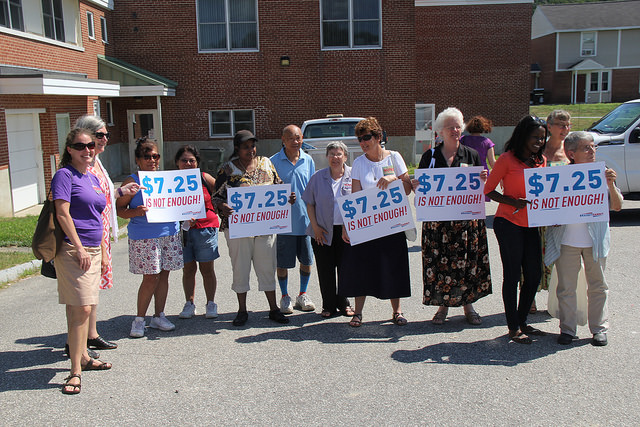 In the afternoon, the Granite State Organizing Project of New Hampshire invited us to visit a public housing development in Manchester composed of 250 units which are occupied by an extremely diverse community. The residents proudly described their newly organized Resident Council, whose motto is “togetherness is community.” I thought of the tagline of my ministry at Providence House – “Creating Communities – Transforming Lives.” I felt a synergy with the residents’ desire here and the strength that we all find when we are part of a caring community that supports one another! We learned in our visit that in the past 2 years the council has developed a Homework club, English language classes, and other social activities for the whole community. Dot who participated in their leadership training program spoke of how she learned to plan and prioritize her goals, and after 2 years was now on track to move to Georgia to reunite with family. Dot was thrilled that we had come to visit and hear their stories. Another humbling moment, as I thought of the women and children back home at Providence House – have I missed similar opportunities?
In the afternoon, the Granite State Organizing Project of New Hampshire invited us to visit a public housing development in Manchester composed of 250 units which are occupied by an extremely diverse community. The residents proudly described their newly organized Resident Council, whose motto is “togetherness is community.” I thought of the tagline of my ministry at Providence House – “Creating Communities – Transforming Lives.” I felt a synergy with the residents’ desire here and the strength that we all find when we are part of a caring community that supports one another! We learned in our visit that in the past 2 years the council has developed a Homework club, English language classes, and other social activities for the whole community. Dot who participated in their leadership training program spoke of how she learned to plan and prioritize her goals, and after 2 years was now on track to move to Georgia to reunite with family. Dot was thrilled that we had come to visit and hear their stories. Another humbling moment, as I thought of the women and children back home at Providence House – have I missed similar opportunities?
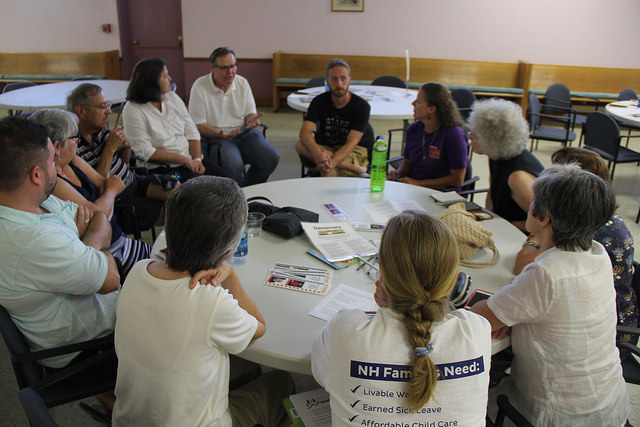 The evening was a caucus event at Holy Cross Center Manor. Spirited conversations with men and women from the local community ensued on the seven gap issues, each sister being responsible for a different gap conversation to moderate. Mine was affordable housing -– a natural fit!
The evening was a caucus event at Holy Cross Center Manor. Spirited conversations with men and women from the local community ensued on the seven gap issues, each sister being responsible for a different gap conversation to moderate. Mine was affordable housing -– a natural fit!
Attendees talked about the unique features of the New Hampshire “citizen legislature” that really only allows wealthier citizens to be elected, thus ensuring that the laws do not really benefit the 100%.
During the report out from the small groups, we had several refugees from Bhutan share about their gratitude for Social Security Insurance for the elderly, but at the same time say they were not able to earn a living wage. A lawyer from Ghana said she was not able to continue in her same profession here in the United States and that there were many refugees and immigrants who were highly educated, but who were forced to do menial, minimum wage jobs because their licensing or training didn’t transfer.
We also heard from people who called for a single-payer healthcare system, and for tax reform to create a more just, progressive tax policy. Before we left, all attending “signed on to the bus” signifying their commitment to working on the ‘Mend the Gap’ issues. I said a heartfelt good bye to cousin Gail, and put a close to a very full day. I felt enormously blessed!
See also:
Reflection: A Pivotal Moment in Time
Slideshow: Concord Rally
Slideshow: Elmwood Gardens (Manchester) Site Visit
Slideshow: Manchester Caucus






